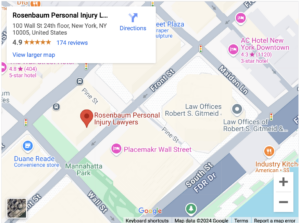Mitigate Damages

Personal injury victims have a duty to mitigate their damages after an accident.
A failure to fulfill this duty could reduce the amount of compensation you can recover for your injuries.
A defendant can claim that because of the failure to mitigate damages, he or she should not be responsible for paying for certain damages resulting from an accident.
What is the Failure to Mitigate Damages?
You may have many types of damages after an accident, such as:
- Medical bills
- Lost wages
- Loss of earning capacity
- Property damage
- Pain and suffering
You have the right to seek compensation for all of these damages. However, you have a duty to avoid making your damages worse than they need to be.
If you purposely or negligently take actions that increase your damages, the defendant can raise a defense claiming you failed to mitigate your damages. If successful, this defense could limit the compensation you are entitled to receive.
Illustrating the Failure to Mitigate Damages
A common example of mitigation of damages occurs in landlord-tenant law. The tenant has a one-year lease and then needs to break the lease.
The tenant would generally be required to keep paying rent for the full lease term. However, under New York law the landlord must try to rent the unit to another tenant. This needs to be a reasonable attempt under the circumstances.
Once the landlord finds a new tenant, the old tenant is off the hook. If the landlord doesn’t try to find a new tenant or makes a half-hearted effort, then the old tenant can raise a defense saying that the landlord failed to mitigate his damages.
Mitigating Damages in Personal Injury Cases
There are a few situations where mitigation of damages comes up in personal injury cases. If you’re dealing with any of these situations, talk to a personal injury attorney to make sure you are fulfilling your legal obligations.
Follow Your Doctor’s Orders
Getting good medical care is critical after a car accident or any type of personal injury. You need to follow your doctor’s orders to make sure your injuries heal as quickly as possible.
If you don’t listen to your doctor, you may provide an opening for the defendant to claim you made your injuries worse than they should have been. The defense of failure to mitigate damages could come up in any of the following situations:
- You consistently miss doctor’s appointments.
- You don’t do physical therapy as prescribed by your doctor.
- You don’t take the medication your doctor has prescribed.
- You perform activities before your doctor says you are ready for them and you exacerbate your injuries.
- You refuse treatment without a valid reason.
In some cases, there may be a gray area concerning whether you adequately mitigated your damages. For example, you refused surgery because you didn’t think it was necessary. You may need to get a second opinion from a doctor who states you don’t actually need surgery to prove your actions were reasonable.
Take Time to Recover
Don’t push yourself while you are recovering from your injuries. You may need to cancel your next vacation or avoid sports and other recreational activities for a while.
If you make your injuries worse because you decide to go hiking or golfing before you are fully recovered, you might not be able to recover compensation for these additional injuries.
The defendant may also claim that you were exaggerating your injuries if you are caught performing leisure activities when you were supposed to be recovering. You can avoid this by taking it easy until your doctor says you are ready to be active again.
Accept a Reasonable Job Offer
Severe injuries may limit your ability to perform your job. However, you still need to accept a job offer if you are able to work.
For example, your injuries may prevent you from doing your old job that required physical labor. If your employer offers you a desk job at a lower pay rate, you may need to accept the offer as part of your duty to mitigate damages.
If you don’t accept the new job, the defendant may claim they should not have to pay the full amount of your lost wages. Instead, they should only pay the difference between your old jobs’ salary and the salary of the job you refused.
How the Failure to Mitigate Impacts Your Damages
A defendant who is found liable for your injuries will pay compensation for your losses. However, there are some limitations and defenses that could reduce your recovery.
For example, the New York comparative fault law reduces the amount of compensation you can receive if you were partially at fault for an accident.
Similarly, a failure to mitigate damages could reduce the compensation you receive. The defendant would only be required to pay damages for expenses not impacted by the failure to mitigate. You won’t be entitled to any additional expenses–such as lost wages for more time missed at work or additional medical bills.
Contact a Personal Injury Attorney
If you have questions about what you need to do to mitigate damages, contact a personal injury attorney. Request a free consultation at (212) 514-5007 and find out what you should be doing to seek financial compensation for your injuries.



